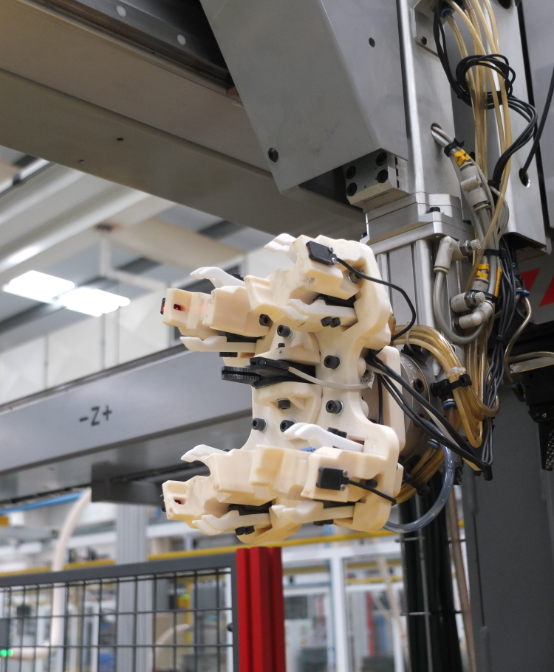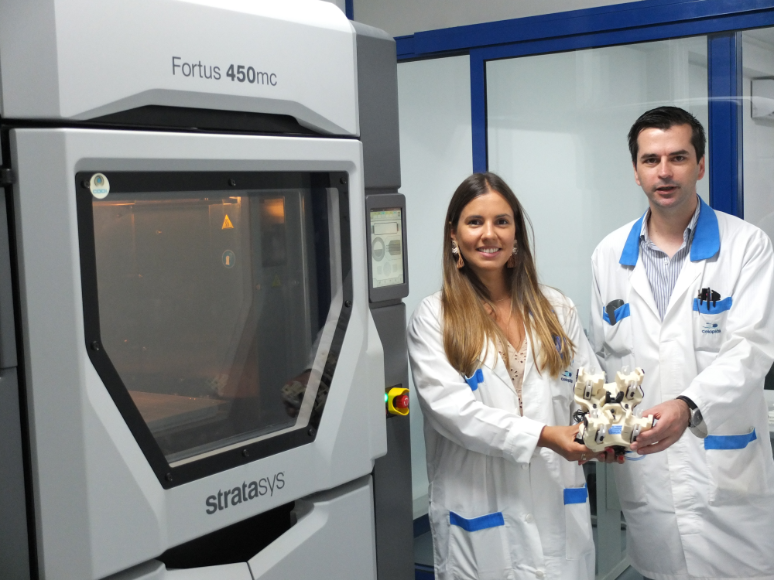Formed in 1989 in Barcelos, Portugal, Celoplás is a developer and manufacturer of technical and precision components using injection molding and micro injection molding. The company services global industries including automotive, electronics, electrical, optics, construction and medical. To improve customer responsiveness, the Celoplás R&D team continually strives to optimize its production capability with new technologies and processes. When it looked at its production line tooling, the team acknowledged limitations with traditional manufacturing methods that needed to be addressed. As a result, the company established an internal case study to evaluate the potential for additive manufacturing to overcome these problems.
Ana Cortez, Celoplás RD&I Manager explained: “For the production of our tooling we have always used milling or grinding, but for more complex tools we have been limited to straight geometries which, for some applications, has prohibited our manufacturing efficiency. In addition, the weight of some of the aluminum tools we produce pose issues for the machinery they are deployed on. As a result, we developed a business case for a polymer additive manufacturing solution that could not only address the geometry and weight limitations of traditional metal tool production, but also accelerate our production lead times.”
Having explored a number of industrial-grade solutions for the production, Celoplás invested in an FDM Fortus 450mc 3D printer from Stratasys local partner, CODI. Today, the system is deployed extensively for a range of tooling applications, including 3D printed fixtures for quality validation on the manufacturing floor, as well as jigs to perform dimensional measurements on injection molded parts. But some of the biggest manufacturing efficiencies gained have been for end-of-arm tooling, which played a key role in proving the business case for FDM additive manufacturing.
On the production line, handling tools for robotic arms are essential for removing parts from molds at the end of each injection molding cycle and then depositing them onto a conveyor belt to be packed. Traditionally, these tools are milled out of aluminum and acetal. But the process is time consuming and the design of the tools is limited compared to what’s achievable with additive manufacturing.
“Since using the Fortus 450mc, we discovered that we were no longer limited by the constraints of traditional production methods when producing the handling tools for the robotic arms,” said Cortez. “For example, complex geometries such as internal air channels and curved trajectories were not possible using CNC. We can now optimize the design of the tool with intricate and minute detail, knowing that the Fortus 450mc will deliver a complex tool quickly, but with high accuracy and repeatability. Indeed, with the 3D printer we can fuse parts in one single print to achieve more organic geometries.” In addition to solving the geometry challenge, replacing the aluminum robotic handling tool with a much lighter thermoplastic counterpart has delivered additional benefits.
“The 3D printed handling tool is 40% lighter than our previous metal tool. This alleviates the strain on the robotic arms significantly, which is crucial because not only does this increase their speed of movement and productivity, but a lighter tool reduces the rate of degradation of the robot,” explained Cortez. “We are also able to produce the tools much faster, approximately 40% less time compared to the conventional methods, and at a much lower cost.”
Having previously outsourced much of its tooling production, the integration of FDM technology in-house has had a much wider impact on the company’s production capability as a whole. The ability to 3D print customized production tools on-demand means Celoplás is much less dependent on suppliers and more agile in responding to manufacturing requirements.
“Additive manufacturing has become an integral part of our manufacturing operation, enabling us to become much more flexible with our manufacturing projects,” said Cortez. “Outsourcing previously left us very little room for error when we had to make sudden design changes to a tool, which would then cause a delay in production. Now at the request of an engineer, we can redesign and 3D print a customized tool in a matter of hours and at a fraction of the cost, and have it implemented on the production line immediately.
This has made a significant impact in accelerating our manufacturing lead times and enabled us to better meet our customer’s delivery times in a much more innovative way.” Having successfully validated the business case for the Fortus 450mc, Celoplás has now set its sights on increasing the use of FDM additive manufacturing across the factory floor to further optimize its production process. Cortez concluded, “We’ve also tested the possibility to overmold metal inserts on parts produced with FDM. We tested this approach on our handling case study and had a lot of success – decreasing assembly time quite significantly. This is one of a few areas where we can see immediate opportunity to enhance with additive manufacturing.”

